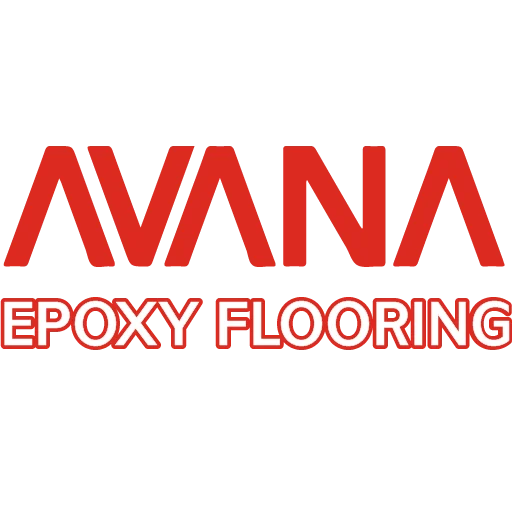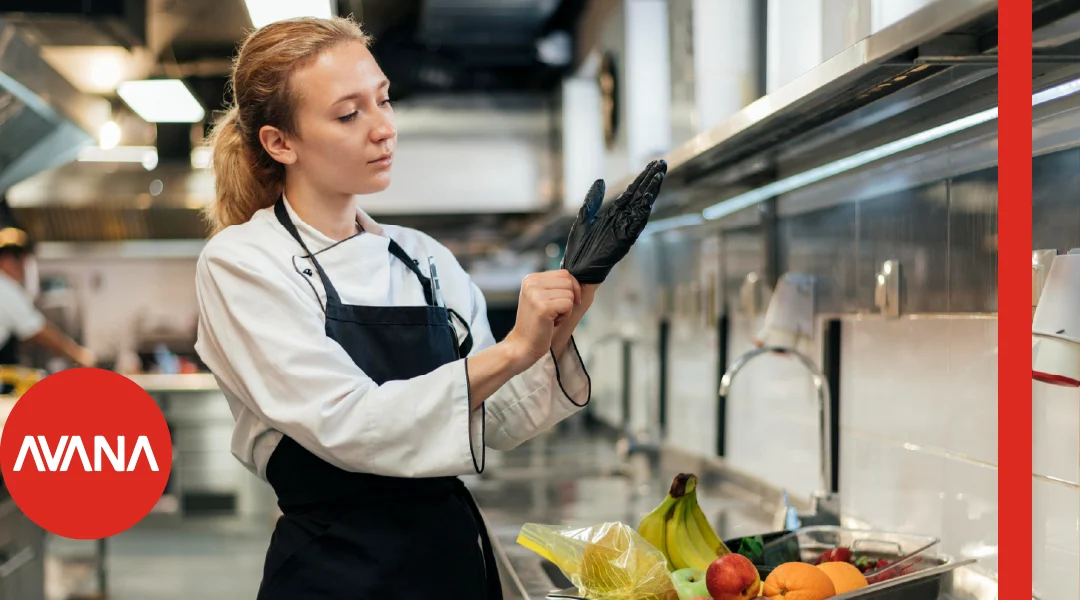Kitchen is the heart of every home. This is to say, everything you eat comes directly from the kitchen and you should prepare it according to health and safety standards. Can you epoxy a kitchen floor? Absolutely! Whether you own a home or a commercial kitchen, epoxy is a great option for flooring and coating, due to being hygienic and also strong.
Spills, stains, grime, dust, and dirt — you can’t have a kitchen without these things involved. Epoxy is among one of the many great investments you can do for your kitchen, as it can be one of the strongest materials against them.
This article covers everything you need to know about kitchen epoxy flooring — health concerns, safety concerns, and the edge epoxy has on other materials.
Epoxy Resin Flooring And Its Benefits
If you are new to the epoxy world, it’s better to know some basic facts about epoxy resin. Epoxy is a durable and highly customizable flooring and coating material and It can be used as both decorative and protective. There are many types of epoxy flooring and each is suitable for a particular area.
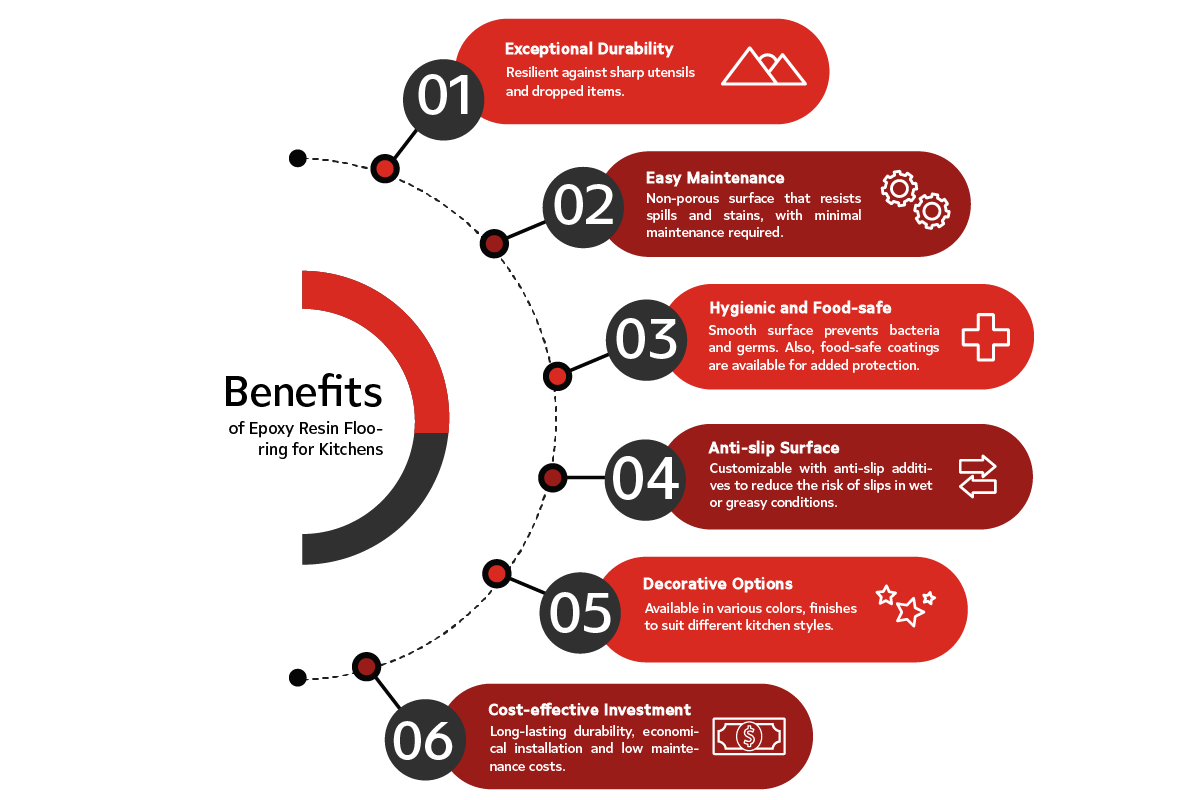
Benefits Of Epoxy Flooring For Kitchen
Exceptional Durability
In a kitchen, sharp utensils, and the occasional dropped pot or pan are common, the resilience of epoxy is a trump card over other materials. Other flooring options may chip, crack, or become discolored over time. On the other hand, epoxy is tough and provides a long-lasting protection that endures the demands of a busy kitchen.
Easy Maintenance
Epoxy is a non-porous material. This is vital when it comes to the kitchen environment. Because an epoxy surface does not absorb spills or stains. Whether it’s a splash of sauce, a dropped egg, or a spill of oil, these substances can be effortlessly wiped away. This makes for easy cleaning and good looks, all of which are perfectly maintained with just a simple epoxy maintenance plan. This resistance prevents the surface from discoloration over time, unlike other flooring materials.
Hygienic and Food-safe
Epoxy flooring and coating are perfect for kitchens because they keep the area clean and safe for food preparation. Epoxy has a smooth flat surface and doesn’t leave tiny cracks for bacteria and mold to hide. Additionally, the smooth surface makes it easy to wipe away germs and dirt. On top of that, there are specific food-safe epoxy coatings that are designed for kitchen use.
One major concern for epoxy users is toxic leaking issues. People think that sharp utensils can make cracks on epoxy and then, toxic chemicals leak into their food. However, epoxy floors can handle chemical and mechanical stress without breaking down, and maintain the top layer. This makes for a safer cooking space and protects you from food poisoning.
Anti-slip Surface
Epoxy flooring and coating can be customized for being slip resistant, which is a significant advantage in any kitchen. Spills and splashes are inevitable in kitchens, creating potential concerns for slips and falls. Anti-slip additives provide a textured surface to epoxy, enhancing grip even when the floor is wet or greasy. This is particularly useful in a busy commercial kitchen where safety is key and such slips accidents can result in serious injury. Epoxy flooring reduces the risk of slips, keeping your kitchen a safer place to work on your feet, the whole time!
Decorative Options
Epoxy flooring and coating offer not only practical benefits but also enhance the beauty of your kitchen. They are available in a wide range of colors, finishes, and decorative effects. There are three main finishes available: clear epoxy, solid epoxy, and metallic epoxy flooring. Whether you prefer a sleek, modern look with a glossy finish or a matte texture, epoxy can be tailored to match your preferences. This versatility makes epoxy flooring suitable for a variety of kitchen styles, from contemporary and industrial to classic and rustic.
Cost-effective Investment
Epoxy flooring and coatings are highly cost-effective for two main reasons:
Longevity
One of the primary reasons for their cost-effectiveness is their longevity. Epoxy floors are extremely durable and can withstand heavy foot traffic, spills, and impacts without showing signs of wear. Conventional wisdom agrees upon at least 20 years of lifespan for epoxy. This is only the baseline. On top of that, with minimal epoxy flooring maintenance you can have strong and shiny floors for almost half a century!
Economical Installment
Installing epoxy is straightforward and quick, which reduces labor costs. Furthermore, they are easy-to-clean surfaces and you don’t need to pay extra money on cleaning supplies and labor. A warm water and a dust mop gets the job done.
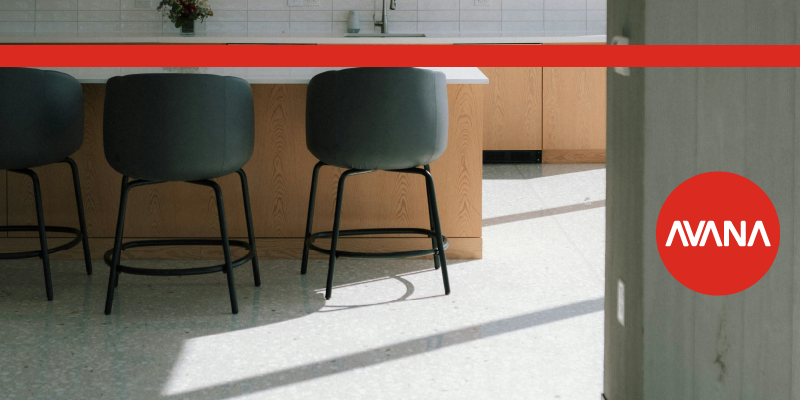
Best Floor And Coating For Commercial Kitchens And Restaurants
Every large-scale and industrial epoxy flooring should possess these essential qualities:
Quick and easy installation: Choose a flooring system that can be installed quickly with low downtime.
Antimicrobial and hygienic: Ideal kitchen floors should be non-porous to prevent growth of bacteria or fungi in cracks.
Slip resistance: It’s essential for restaurant kitchen floors to be slip-resistant — because you care about the safety of your kitchen staff.
Durability: Kitchen coatings and floors must endure high temperatures and spills of boiling liquids and moisture.
Easy maintenance: A proper kitchen flooring is easy to clean.
With all those required qualities in mind, there are three worthy options available for kitchen epoxy flooring. We introduce them and give you a brief description for each:
1. Epoxy Resin:
Epoxy is a tough and long-lasting choice great for kitchen floor and coatings because it makes a smooth and solid layer. This means it can take spills, marks, and lots of use without soaking in water or hiding germs. Also, epoxy won’t let you slip when mixed with anti-slip additives, making it safer in busy kitchens where slips can happen. All in all, epoxy’s strong nature, easy care, and safety bits make it a smart pick to make kitchen floors both work better and look nicer.
2. Polyurethane :
Polyurethane is a worthy choice for kitchen floors as it is tough and simple to lay down. It’s strong and holds up well under lots of use, making it a practical choice for busy kitchens.
3. Ceramic Tiles:
We know! It is a classic flooring system, but it is timeless. You want to know why? The answer lies in only one word — “Simplicity”. Everything about it is straightforward. Installment is straightforward; routine cleaning is straightforward; replacement is straightforward. But there is something you should be aware of. Commercial kitchens go through harsh operations. Therefore, ceramic tile floors may be damaged, retain odors, and experience water going underneath the tiles. This might result in higher maintenance expenses in the long-term.
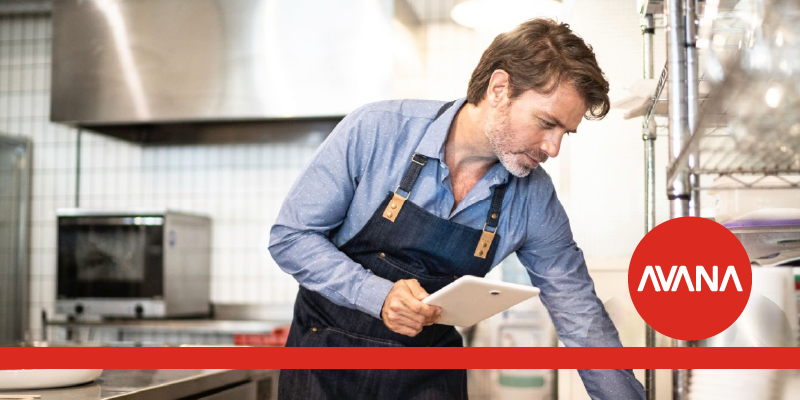
Need More Help To Make A Decision?
Ready to transform your kitchen with kitchen epoxy flooring but still uncertain? Don’t worry! Contact our specialists today to get all your questions answered and learn more. We help you towards building a dream kitchen.
FAQ
Can you epoxy a kitchen floor?<br />
Yes, you can epoxy a kitchen floor. Epoxy provides a durable surface that is resistant to stains and makes your kitchen beautiful with amazing colors and patterns.
Can you epoxy a kitchen sink?<br />
Yes! You can use epoxy for coating kitchen sinks. It matches with different sink materials and offers a durable coating that lasts.
Can you epoxy kitchen cabinets?<br />
There is no limit for using epoxy as coating for kitchen cabinets and countertops.
